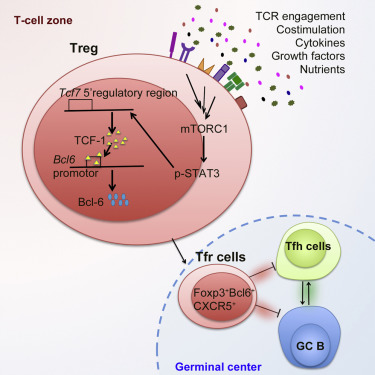Immunity: 揭示抗体生成负向调节性T细胞分化的重要机制
The Kinase mTORC1 Promotes the Generation and Suppressive Function of Follicular Regulatory T Cells
Immunity, Volume 47, Issue 3, p538–551.e5, 19 September 2017
Lifan Xu, Qizhao Huang, Haoqiang Wang, Yaxing Hao, Qiang Bai, Jianjun Hu, Yiding Li, Pengcheng Wang, Xiangyu Chen, Ran He, Bingshou Li, Xia Yang, Tingting Zhao, Yanyan Zhang, Yifei Wang, Juanjuan Ou, Houjie Liang, Yuzhang Wu, Xinyuan Zhou, Lilin Ye
Highlights
•Tfr cells exhibit elevated mTORC1 signaling compared to Treg cells after stimulation
•mTORC1 signaling initiates Treg to Tfr cell differentiation
•Differentiated Tfr cells require mTORC1 signaling to perform suppressive effects
•mTORC1 regulates Tfr cell differentiation through p-STAT3-TCF-1-Bcl-6 pathway
Summary
Follicular regulatory T (Tfr) cells differentiate from conventional regulatory T (Treg) cells and suppress excessive germinal center (GC) responses by acting on both GC B cells and T follicular helper (Tfh) cells. Here, we examined the impact of mTOR, a serine/threonine protein kinase that senses and integrates diverse environmental cues, on the differentiation and functional competency of Tfr cells in response to protein immunization or viral infection. By genetically deleting Rptor or Rictor, essential components for mTOR complex 1 (mTORC1) and mTOR complex 2 (mTORC2), respectively, we found that mTORC1 but not mTORC2 is essential for Tfr differentiation. Mechanistically, mTORC1-mediated phosphorylation of the transcription factor STAT3 induced the expression of the transcription factor TCF-1 by promoting STAT3 binding to the Tcf7 5′-regulatory region. Subsequently, TCF-1 bound to the Bcl6 promoter to induce Bcl6 expression, which launched the Tfr cell differentiation program. Thus, mTORC1 initiates Tfr cell differentiation by activating the TCF-1-Bcl-6 axis during immunization or infection.



